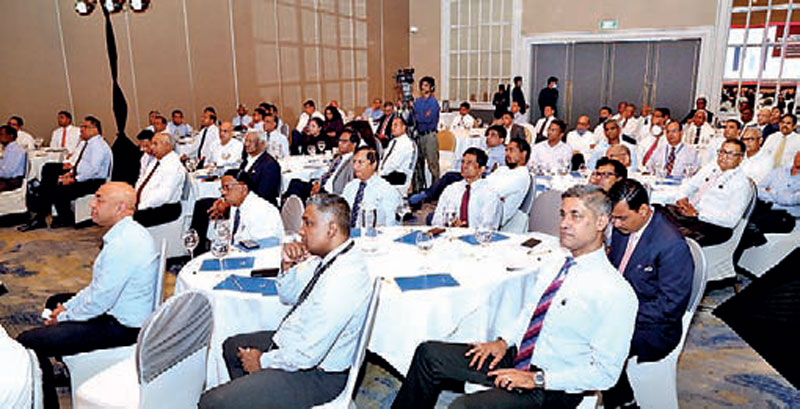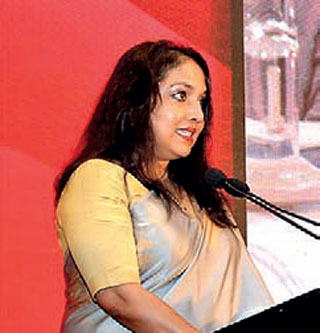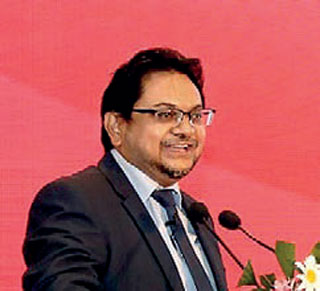Sunday Feb 22, 2026
Sunday Feb 22, 2026
Monday, 10 October 2022 00:00 - - {{hitsCtrl.values.hits}}

Panel session at the CA Sri Lanka CEOs Breakfast Forum in progress

Central Bank of Sri Lanka Governor Dr. Nandalal Weerasinghe with CA Sri Lanka President Sanjaya Bandara, CA Sri Lanka Immediate Past President Manil Jayesinghe, CA Sri Lanka Past President Reyaz Mihular, and CA Sri Lanka Past President Sujeewa Rajapaksa

A section of the participants at the CA Sri Lanka CEOs Forum
 |
| CA Sri Lanka Chief Executive Officer Dulani Fernando delivering the welcome speech |
 |
| Verité Research Executive Director Dr. Nishan de Mel delivering the keynote |
The Institute of Chartered Accountants of Sri Lanka (CA Sri Lanka) recently organised a CEOs Breakfast Forum which paid special focus on how and what Sri Lanka must do to progress from crisis to sustainability as the country battles its worst ever economic disaster in history.
Verité Research Executive Director Dr. Nishan de Mel delivered the keynote speech at the houseful event which was attended by top Chief Executive Officers and Corporate Chairmen. The keynote was followed by an insightful panel session which featured Ministry of Finance Department of Fiscal Policy Director General Dr. Kapila Senanayake, John Keells Holdings Chairman and Ceylon Chamber of Commerce Deputy Vice Chairman Krishan Balendra, EY Country Managing Partner Sri Lanka and the Maldives, and CA Sri Lanka Immediate Past President Manil Jayesinghe, TW Corp Ltd. Chairman/CEO and BOI former Chairman Thilan Wijesinghe, and First Capital PLC Head of Research Dimantha Matthew. The session was moderated by CA Sri Lanka President Sanjaya Bandara.
Central Bank of Sri Lanka Governor Dr. Nandalal Weerasinghe, Inland Revenue Commissioner General D.R.S. Hapuarachchi, and Securities and Exchange Commission Chairman Viraj Dayaratne PC, were among the special invitees who attended the forum.
CA Sri Lanka Chief Executive Officer Dulani Fernando set the tone of the event by delivering a welcome speech where she elaborated on the need for a collective effort from the Government, policymakers, the private sector, public sector, and professional bodies to play their part in helping rebuild Sri Lanka’s economy.
“As a leading professional body, CA Sri Lanka has already taken the initiative by organising the first ever tax symposium where we deliberated and discussed prudent tax policies for economic stability and previously, we also submitted a comprehensive set of proposals to the Ministry of Finance and Central Bank focusing on reviving the economy,” she said.
In his keynote, Dr. de Mel provided an overview of the current economic state in the country and highlighted the inflation, which had hit 64% while food inflation is at 93.7%. He noted the food inflation was “particularly worrying” as it is having an enormous consequence on poverty and poverty lines. “In 2019, the poverty line stood at 6966, but by July this year it is about to double, and when poverty lines double, then the level of poverty can even triple,” he warned.
He said that when it’s business as usual, then the results too will be the same. Elaborating further, Dr. de Mel highlighted that “business as usual” means that in the last 56 years, Sri Lanka has been part of 16 IMF programmes and failed to complete seven of them, which were long-term programs. “We have a track record where we have not achieved this kind of target. So, if it is business as usual, then we should expect results to also be ‘usual’, which means we could even miss this IMF target, and then the expected projections will not be achieved and Sri Lanka will be back in difficulty five years from now asking the world again for assistance,” he cautioned.
According to him only either the economy or vested interests can survive. He blamed “vested interests,” as the culprit for driving the economy to its current state. “You are among the most powerful in trying to change the course of Sri Lanka’s economy, and you must know that both can’t survive, and if vested interests are under control, then we can move away from business as usual and chart a better path for Sri Lanka’s economy,” he told corporate leaders.
During the panel discussion, Balendra provided an in-depth overview of how the shortages and increased power cuts during the previous months had impacted the day-to-day operations, apart from elaborating on the new steps his company was taking to educate farmers on better agricultural practises as many had relied on and overused the heavy subsidies provided the past.
Sharing his experience, Wijesinghe who was part of several privatisations of public entities in the past, explained that what Sri Lanka needs to succeed is “political leadership’ without which the country will be back to square one.
While highlighting the need to increase awareness and educate the public on why it’s important to pay taxes and how it helps the economy, Jayesinghe said that it is also important to look at the whole equation of incentives and why they must be given only if it contributes to the greater growth of the economy.
Dr. Senanayake said that in the past, Sri Lanka had undergone a series of crises, but this is a dire crisis and blamed a legacy of policy mistakes and missed opportunities for reforms that have brought Sri Lanka to the current state.
Matthew predicted a “revival” with new SMEs likely to establish in early and mid-next year. However, he cautioned that positive GDP growth will not be seen at least until the fourth quarter. “If that is the case, the negative GDP growth will be prevalent for a longer period of time and the finance sector should be especially focused on survival—until the economy comes back into pace.”